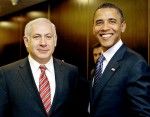A Privileged Relationship

Major religious holidays typically call for a presidential remark on the occasion, and this year’s Passover celebration was no different. On April 18, President Obama held a “kosher-style” Seder (one wonders what this term entails, but I digress), and he delivered some reflections on the holiday. “The story of Passover … instructs each generation to remember its past, while appreciating the beauty of freedom and the responsibility it entails,” he said. “This year that ancient instruction is reflected in the daily headlines as we see modern stories of social transformation and liberation unfolding in the Middle East and North Africa.”
In true one-world fashion, Obama linked the Jewish faith’s sacred holiday to recent developments among the predominantly Muslim, Arab world, calling Passover “a joyous celebration of freedom.” Yet by focusing only on the escape from slavery in Egypt and extending the lessons of Passover to the world at large, Obama cheapens the true celebration at hand: commemorating the Jews’ status as God’s Chosen People, upon whom he bestowed a sacred home in Israel.
Modern Israel functions as a rebirth of the ancient Promised Land, established in 1948 as a reaction to the extreme persecution the Jewish people suffered during the Holocaust. An internationally supported endeavor, Israel served as a refuge for a people who had been nearly exterminated in Europe, who deserved a safe place to relocate. The Jews who returned to their ancient homeland wished to recreate a state based upon the tenets of their religion – notably, a sentiment shared today by states founded on the principles of Islam.
In the 63 years since its founding, Israel has grown to become one of the United States’ staunchest, most dependable and crucial allies. It played a vital role in neutralizing Soviet influence in the Middle East during the Cold War, and since then has contributed greatly in our efforts to fight terrorism and prevent the rise of states hostile to the U.S. With its notoriously competent intelligence agency in a dangerous and hard-to-access region – and its willingness to share findings with us – Israel’s proliferation is integral to U.S. security interests.
Beyond its utility to the U.S., however, Israel serves as an example of freedom and stability in a region plagued by oppression and unrest. According to Freedom House’s annual map of worldwide press freedom, Israel is the only country of the 19 in the Middle East with a rating of free – a strong indicator of the quality of life experienced there versus other nations. Strengthening the volatile Middle East will only happen through the spread of this freedom, and Israel is the seed whereby it can grow.
Democrat or Republican, every U.S. president since Israel’s establishment has treasured and cultivated the special relationship we have with that country – Bill Clinton proved to be one of its most supportive allies. Yet Obama has repeatedly broken precedent and snubbed Israel, tacitly indicating his disinterest in maintaining this important alliance.
He humiliated Israeli Prime Minister Benjamin Netanyahu when Netanyahu visited the White House in March 2010, an abominable display of petulance resulting from Obama’s distaste for Netanyahu’s authorization for the building of East Jerusalem settlements. Beginning by sending him to the back door and denying him typical red-carpet treatment afforded to heads of state, he also refused to pose for photos with Netanyahu, left him to meet with staffers (telling them to “let [him] know if there was anything new”) and left a meeting for a private dinner with Michelle and their daughters. The Israeli people were outraged, and rightly so.
This president let pass Helen Thomas’s admonishment to the Jews to “get the hell out of Palestine” without so much as a comment, and his support of Israel following the Gaza blockade episode in May 2010 was tepid when considering the former strength of this relationship.
But what happens in the world with a weakened or non-existent Israel? A question a college senior with 100 words to explain surely can’t answer, but it’s worth noting the type of leadership that currently exists in Palestine, and throughout the Middle East. Hamas – despite its relatively extensive social programming – still functions in part as a terrorist group. It recruits and trains suicide bombers, and regularly launches missile attacks against Israel. As recently as earlier this month, children died from wounds retained in a school bus bombing. Its charter proclaims in Article 7 that it seeks the destruction of the Jews. And this party currently holds the majority in Palestine’s legislative body.
In a region already filled with hostility and unrest – whether in the form of Iran, undisputedly run by madmen, or even Saudi Arabia, whose tenuous ties to terrorist groups like al-Qaida are a source of concern – the United States cannot afford to abandon Israel, for both our sakes.
Besides, it surely can’t hurt to maintain an alliance with God’s Chosen People.









